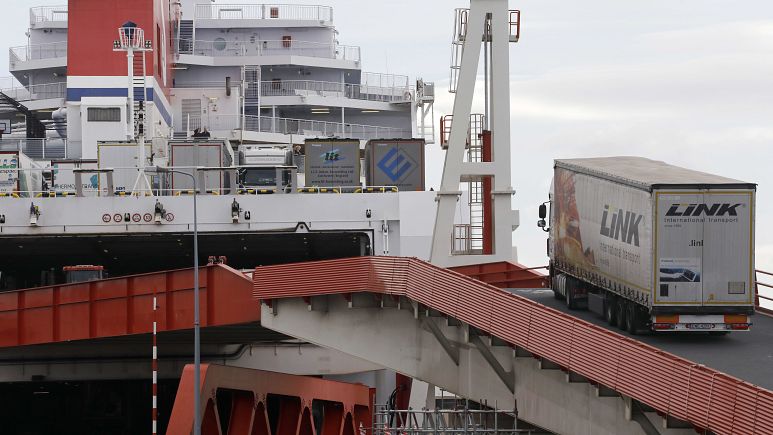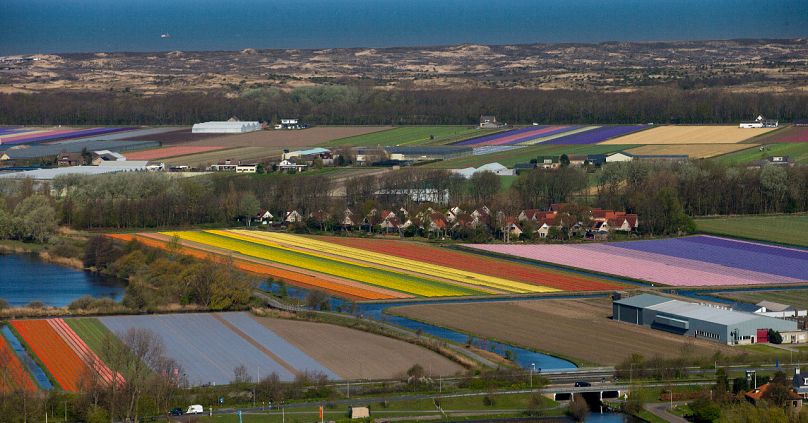Post-Brexit trade talks: How badly do Europe's exporters need a deal with the UK?
It was an argument often advanced by Brexit supporters in the wake of the UK's 2016 referendum. The clout of EU business would weigh in Britain's favour in the negotiations. German cars, French wine, Italian Prosecco, Danish bacon... common sense would prevail and Brussels would ensure that European goods still flowed smoothly into the UK.
But barely three months before the December 31 cutoff date that will sever the current trading system, and with warning sirens now blaring, talks on future arrangements have been in a quagmire. Negotiations resume this week ahead of a make-or-break summit in October.
In recent weeks many major European exporters to the UK -- as well as their British counterparts who sell into Europe -- have sounded cries of alarm. Unless there is a deal, they warn of disruption and higher costs on both sides of the English Channel.
January 1 will bring major changes regardless, with customs and regulatory red tape kicking in once the UK leaves the European Union's Single Market and Customs Union.
But failure to strike a new trade deal would amplify friction -- and this amid the onslaught of the coronavirus pandemic which has already caused devastating hardship.
The EU and UK would trade on World Trade Organization (WTO) terms -- bringing tariffs, and access to each others markets reduced to an equal footing with all countries in the same situation.
Car industry: 'Pull out all the stops'
Road vehicles topped the list of EU goods imported into the UK in 2019, according to UK trade figures. They were valued at €53 billion, nearly a fifth of all UK goods imports. Almost half of all UK vehicle imports came from the EU.
In September the European car industry issued a siren call as trade bodies from across the continent called on both sides to "pull out all the stops" to avoid a "no-deal Brexit disaster".
Pointing out that the sector supports over 14 million livelihoods -- one in 15 of EU and UK jobs -- the European Automobile Manufacturers Association (ACEA) said a no-deal outcome would mean up to €110 billion in losses to 2025. Nearly half of these would be suffered by UK plants.
CLEPA, the body representing European suppliers and one of the 23 signatories, warned that a "disorderly exit of the UK will exacerbate the stress" amid the economic crisis and the transition to a greener, more automated industry.
"The sector needs negotiators to strike a deal. And equally important, the sector needs a deal that maintains the industry’s global competitiveness," its statement said.
Another signatory was Germany's car industry body the VDA, which pointed out that its members have more than 100 production sites in the UK.
It has previously said that despite the UK's importance, the cohesion of the EU Single Market is even more so. According to industry figures, 30% of EU vehicle exports went to the UK in 2019.
European Car Makers made similar calls amid fears over a no-deal Brexit in 2019
Agriculture, food and drink: 'Do everything to prevent chaos'
Meat, dairy, fruit and vegetables, drinks, ingredients... EU figures say the UK was the top destination for the bloc's agri-food exports, worth over €40 billion in the year to January 2020. In recent years nearly half of UK imports from the EU have come from the Netherlands, Germany, France and Ireland.
In June three major European industry bodies came together to warn of the "significant negative consequences" from a no-deal scenario that would bring tariffs and disrupted supply chains.
"These can be expected to include a major decrease in export volumes from the EU to the UK, a significant fall in revenue, and consequential job losses. The impact on SMEs, farmers and agri cooperatives would be particularly detrimental," said the joint statement from the European farmers body Copa-Cogeca, the agri-food trade body Celcaa, and the industry confederation FoodDrinkEurope.
They added that it was of "utmost importance" to keep close ties between EU and UK food standards agencies, calling for temporary arrangements in 2021 if no agreement is reached.
or Dutch farmers and market gardeners, the UK is the third-largest destination in an export market worth €8 billion euros annually, according to the agricultural producers body LTO Nederland. "Whatever happens, the Dutch government must do everything in its power, in cooperation with European partners and the United Kingdom, to prevent chaos at the borders," it says.
Scandinavia's largest dairy producer, Danish-Swedish multinational Arla Foods, said in September that consumers would largely have to foot the bill from an estimated no-deal cost to the company alone of €100 million. It has previously said Europe's dairy exporters could face costs of almost €9 billion from UK tariffs.
Bacon and butter from Denmark ending up on British breakfast tables would also be affected if there was no trade deal. An OECD report in 2019 estimated that Danish agri-food exports to the UK would fall by nearly a quarter under a "worst-case outcome". Yet the giant pork exporter Danish Crown said it was "not afraid the UK market is crumbling", confident that the British appetite for European meat would survive no deal.
Wine trade: No deal 'will hit the little guys'
The prospect of tariffs and more red tape would likely put up the price of European wines in the UK, where sales have already been hit by the pandemic.
The Domaine Gayda winery in France's Languedoc region sends a third of its exports to the UK, some 15% of its total production of 1.4 million bottles. Managing Director Tim Ford has nurtured the British end of the business over 18 years.
"We've developed a marketing system of going direct to small wholesalers, restaurant chains, and even the odd small wine shop in London and all over the country -- and that business model now is completely under threat with the new possibility of a no-deal Brexit," he told Euronews.
Ford describes such a scenario as a "game-changer", adding that his wine bottles would face costly new regulations in the UK relating to traceability and health and safety.
All his clients would need their own individual labels. "Then for every shipment, even small ones, we'll have to get a full analysis of every wine, which is costing like €65 a wine. So that almost prohibits economically these small direct shipments," he added.
"The really tragic thing is if there's no deal, it'll privilege the large importers like the large supermarkets, people that can afford to order big volumes," Ford said.
"This is going to prejudice the small entrepreneurial wine shop, restaurant owner, wholesaler. The extra costs of us re-labelling and analysing wine, we'll have to pass it onto them. And it'll make their costs of import so much higher than the big guys."
The UK imports an estimated €20 billion worth of medicinal drugs and other pharmaceutical products from the EU annually, with the Netherlands topping the list of exporters in terms of value.
The European trade body EFPIA (European Federation of Pharmaceutical Industries and Associations) has spelt out the cost of Brexit, highlighting a report in July predicting a drop in exports of 1.2% in the event of no deal.
The industry attaches particular importance to reaching a mutual recognition agreement (MRA) on inspections and testing. Without this as part of an EU-UK free trade agreement, it says both sides will be less competitive.
"If we fail to get the relationship right then Europe will continue to lose ground to other regions like Switzerland, US, China, Turkey, Russia and Japan. The bigger the disruption to EU-UK pharmaceutical trade, the more other regions benefit," said EFPIA Director General Nathalie Moll.
Read Remainder Here: Euronews






